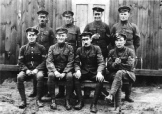…... emptying his last rounds into a factory used by the Germans for repairing apparatus. The following day Compston bagged an Albatros Scout.
That November we became the only Naval squadron operating with the R.F.C. Nos. 1, 9 and 10 (Naval) Squadrons having been withdrawn on November 1, September 29 and November 20 respectively. Mine was an
isolated command, under the White Ensign, miles inland behind the Western Front.
Operating with the 1st Brigade, R.F.C., we took part in the aerial operations in connection with the British Third Army‘s advance at Cambrai, the first time tanks were used in earnest. The German lines were breached and if only the staff had been imbued with sufficient faith and had provided the backing in reserves, 1918 might never have been a war year. By mid-day on the 20th, the first day of the attack, the German Commander-in-Chief, Ludendorff, was already aware of the serious threat to his front. He called for air reinforcements and among those sent down opposite to our sector, came Jagdgeschwader Nr. 1 - the Richthofen Circus. However, the weather then deteriorated and combats were infrequent, if alarms and excursions were not.
Next to his guns, a pilot’s greatest anxiety when in action was his engine. I fear that few pilots knew much about them because training at home was necessarily hurried. The Clerget was not robust enough and soon rattled itself to pieces. I prepared a list of “Don’ts” for running rotary engines which might make amusing reading today:
Read Squadron Commander Draper’s Clerget Engine ‘Don’ts; here:
I would lik e, at this point in the story, to say a few words about the “Ship’s Company” of Naval Eight. It is quite impossible to give enough praise to the fellows who comprised the “lower deck.” To them was due the efficiency of the machines, engines, guns, transport, workshops, stores, office, telephones and the day and night routine that kept up the supplies of food, cooking and the enormous amount of work that went into keeping pilots and machines in the air. No other branch of the fighting forces required so many specialists, and no other Squadron ever had a finer number of these than Naval 8 - not necessarily all experts, but “workers.” Every man gave of his best because they hated war as did the pilots they served and were as anxious as anyone to see the end of it.
e, at this point in the story, to say a few words about the “Ship’s Company” of Naval Eight. It is quite impossible to give enough praise to the fellows who comprised the “lower deck.” To them was due the efficiency of the machines, engines, guns, transport, workshops, stores, office, telephones and the day and night routine that kept up the supplies of food, cooking and the enormous amount of work that went into keeping pilots and machines in the air. No other branch of the fighting forces required so many specialists, and no other Squadron ever had a finer number of these than Naval 8 - not necessarily all experts, but “workers.” Every man gave of his best because they hated war as did the pilots they served and were as anxious as anyone to see the end of it.














